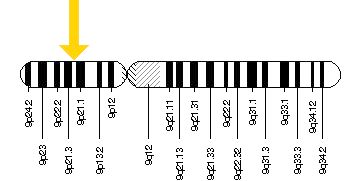C9orf72
C9orf72 is a gene located on the short arm of chromosome 9 (9p21.2) in humans, which has gained significant attention due to its association with neurodegenerative diseases, most notably Amyotrophic Lateral Sclerosis (ALS) and Frontotemporal Dementia (FTD). The gene encodes a protein of unknown function, but mutations in C9orf72 are recognized as the most common genetic cause of familial ALS and FTD.
Function[edit | edit source]
The normal function of the C9orf72 protein remains largely unknown. It is believed to be involved in various cellular processes, including autophagy, the body's way of cleaning out damaged cells, in order to regenerate newer, healthier cells, and the regulation of endosomal trafficking, which is crucial for transport within cells. However, the exact mechanisms by which C9orf72 contributes to these processes are still under investigation.
Genetic Mutation[edit | edit source]
The most common mutation in C9orf72 associated with ALS and FTD is a hexanucleotide repeat expansion. In healthy individuals, a specific DNA sequence (GGGGCC) in the C9orf72 gene is repeated a few dozen times. However, in individuals with mutations, this sequence is expanded to hundreds or even thousands of repeats. This expansion is thought to lead to the formation of toxic RNA foci and dipeptide repeat proteins, which contribute to the development of disease through various proposed mechanisms, including RNA toxicity, haploinsufficiency, and protein toxicity.
Clinical Significance[edit | edit source]
The discovery of the C9orf72 mutation has had a profound impact on the understanding of ALS and FTD. It has facilitated the development of genetic testing for at-risk individuals, enabling earlier diagnosis and the potential for targeted therapies in the future. Moreover, research into the mechanisms by which C9orf72 mutations cause disease is ongoing, with the hope that this will lead to the development of effective treatments for these currently incurable conditions.
Research Directions[edit | edit source]
Current research on C9orf72 is focused on understanding the normal function of the gene, the pathogenic mechanisms of the hexanucleotide repeat expansion, and the development of therapeutic strategies to target these mechanisms. Approaches include targeting the repeat expansions directly, modulating the cellular processes affected by the mutation, and developing biomarkers for early detection and disease progression monitoring.
Search WikiMD
Ad.Tired of being Overweight? Try W8MD's physician weight loss program.
Semaglutide (Ozempic / Wegovy and Tirzepatide (Mounjaro / Zepbound) available.
Advertise on WikiMD
|
WikiMD's Wellness Encyclopedia |
| Let Food Be Thy Medicine Medicine Thy Food - Hippocrates |
Translate this page: - East Asian
中文,
日本,
한국어,
South Asian
हिन्दी,
தமிழ்,
తెలుగు,
Urdu,
ಕನ್ನಡ,
Southeast Asian
Indonesian,
Vietnamese,
Thai,
မြန်မာဘာသာ,
বাংলা
European
español,
Deutsch,
français,
Greek,
português do Brasil,
polski,
română,
русский,
Nederlands,
norsk,
svenska,
suomi,
Italian
Middle Eastern & African
عربى,
Turkish,
Persian,
Hebrew,
Afrikaans,
isiZulu,
Kiswahili,
Other
Bulgarian,
Hungarian,
Czech,
Swedish,
മലയാളം,
मराठी,
ਪੰਜਾਬੀ,
ગુજરાતી,
Portuguese,
Ukrainian
Medical Disclaimer: WikiMD is not a substitute for professional medical advice. The information on WikiMD is provided as an information resource only, may be incorrect, outdated or misleading, and is not to be used or relied on for any diagnostic or treatment purposes. Please consult your health care provider before making any healthcare decisions or for guidance about a specific medical condition. WikiMD expressly disclaims responsibility, and shall have no liability, for any damages, loss, injury, or liability whatsoever suffered as a result of your reliance on the information contained in this site. By visiting this site you agree to the foregoing terms and conditions, which may from time to time be changed or supplemented by WikiMD. If you do not agree to the foregoing terms and conditions, you should not enter or use this site. See full disclaimer.
Credits:Most images are courtesy of Wikimedia commons, and templates, categories Wikipedia, licensed under CC BY SA or similar.
Contributors: Prab R. Tumpati, MD

